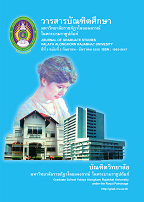รูปแบบการมีส่วนร่วมในการบริหารงานวิชาการของสถาบันการอาชีวศึกษา ภาคตะวันออกเฉียงเหนือ 1
Main Article Content
บทคัดย่อ
การวิจัยครั้งนี้มีวัตถุประสงค์เพื่อศึกษาแนวทางการมีส่วนร่วมในการบริหารงานวิชาการ สร้างและพัฒนารูปแบบและประเมินความเหมาะสมและความเป็นไปได้ในการนำไปปฏิบัติของรูปแบบการมีส่วนร่วมในการบริหารงานวิชาการของสถาบันการอาชีวศึกษาภาคตะวันออกเฉียงเหนือ 1 ดำเนินการวิจัยเป็น 3 ระยะ ระยะที่ 1 การศึกษาแนวทางการมีส่วนร่วมในการบริหารงานวิชาการ โดย การสัมภาษณ์รองผู้อำนวยการฝ่ายวิชาการจำนวน 20 คน พบว่าแนวทางการมีส่วนร่วมในการบริหารงานวิชาการ 5 ด้าน ได้แก่ 1) ด้านการมีส่วนร่วมในการพัฒนาหลักสูตร และกระบวนการเรียนรู้ 16 แนวทาง 2) การมีส่วนร่วมในการจัดทำทะเบียนและวัดผล 15 แนวทาง 3) การมีส่วนร่วมในการส่งเสริมคุณภาพการศึกษา 16 แนวทาง 4) การมีส่วนร่วมในการส่งเสริมพัฒนาสื่อนวัตกรรมและเทคโนโลยีทางการศึกษา 18 แนวทาง 5) การพัฒนาห้องสมุดแหล่งเรียนรู้และภูมิปัญญาท้องถิ่น 12 แนวทาง รวมมีแนวทางการมีส่วนร่วมในการบริหารงานวิชาการ 77 แนวทาง ระยะที่ 2 การสร้างและพัฒนารูปแบบแบ่งเป็น 2 ขั้นตอน ขั้นที่ 1 การสร้างรูปแบบการมีส่วนร่วมในการบริหารงานวิชาการโดยการจัดประชุมการสนทนากลุ่ม 3 ครั้ง ผู้ร่วมสร้างประกอบด้วย ผู้อำนวยการสถานศึกษา กรรมการสถานศึกษา และสถานประกอบการกลุ่มละ 9 คน รวม จำนวน 27 คน พบว่า รูปแบบการมีส่วนร่วมในการบริหารงานวิชาการ 5 ด้าน คือ 1) การมีส่วนร่วมในการพัฒนาหลักสูตร และ กระบวนการเรียนรู้ 2) การมีส่วนร่วมในการจัด ทำทะเบียนและวัดผล 3) การมีส่วนร่วมในการส่งเสริมคุณภาพการจัดการศึกษา 4) การมีส่วนร่วมในการส่งเสริมพัฒนาสื่อนวัตกรรมและเทคโนโลยีทาง 5) การศึกษาการมีส่วนร่วมในการพัฒนาห้องสมุดและแหล่งเรียนรู้ ภายใต้กระบวนการมีส่วนร่วม 4 วิธี คือ 1) การมีส่วนร่วมในการวางแผน 2) การมี ส่วนร่วมในการปฏิบัติ 3) การมีส่วนร่วมในการประเมินผล 4) การมีส่วนร่วมรับผลกระทบ ประกอบด้วย 111 กิจกรรม ขั้นที่ 2 การพัฒนารูปแบบ โดยการจัดประชุมผู้เชี่ยวชาญ ประกอบด้วย ผู้อำนวยการสถานศึกษา รองผู้อำนวยการ กรรมการสถานศึกษา และสถานประกอบการ รวม 9 คน โดยการนำผลจากขั้นที่ 1 มาให้ผู้ร่วมประชุมพิจารณาปรับปรุงพัฒนารูปแบบการมีส่วนร่วมในการบริหารงานวิชาการทั้ง 5 ด้าน นั้นอยู่ภายใต้กระบวนการมีส่วนร่วม 5 วิธี คือ 1) การมีส่วนร่วมในการวางแผน 2) การมีส่วนร่วมใน การตัดสินใจ 3) การมีส่วนร่วมในการปฏิบัติ 4) การมีส่วนร่วมในการประเมินผล 5) การมีส่วนร่วมรับผลกระทบประกอบด้วย 111 กิจกรรมเช่นกัน ระยะที่ 3 การประเมินความเหมาะสมและความเป็นไปได้ในการนำรูปแบบไปปฏิบัติกลุ่มตัวอย่าง ประกอบด้วย ผู้อำนวยการสถานศึกษา รองผู้อำนวยการฝ่ายแผนงานและความร่วมมือครูทำหน้าที่หัวหน้าแผนกวิชา หัวหน้างาน กรรมการสถานศึกษาและตัวแทนสถานประกอบการจำนวน 360 คน เครื่องมือที่ใช้ในการวิจัยเป็นแบบสอบถามมาตราส่วนประมาณค่า 5 ระดับ มีค่าความเชื่อมั่นด้านความเหมาะสม 0.990 ด้านความเป็นไปได้ในการนำรูปแบบไปปฏิบัติของการมีส่วนร่วมในการบริหารงานของสถาบันโดยรวม 0.998 ผู้วิจัยเก็บข้อมูลทางไปรษณีย์ การวิเคราะห์ข้อมูลทางสถิติและการจัดการข้อมูลด้วยโปรแกรมสำเร็จรูปเพื่อการวิเคราะห์ข้อมูลทางสังคมศาสตร์ หาค่าเฉลี่ย ค่าส่วนเบี่ยงเบนมาตรฐาน ผลการวิจัย พบว่า กิจกรรมตามรูปแบบการมีส่วนร่วมในการบริหารงานวิชาการ 5 ด้าน ด้วยกระบวนการมีส่วนร่วม 5 วิธี มีความเหมาะสมส่วนใหญ่อยู่ในระดับมาก มีบางกิจกรรมอยู่ในระดับมากที่สุด ความเป็น ไปได้ในการนำไปปฏิบัติอยู่ในระดับมากทุกกิจกรรม
The purposes of this study were to study a participatory model for academic administration of the vocational education institute Northeastern Region 1 and to evaluate the appropriateness and possibility in implementing the academic administration, The research process was divided into 3 phases. The first phase was to study trends of participatory model by interviewing 20 Deputy Directors, which was found in 5 aspects: 1) participation in Curriculum Development and the Learning Process, 2) participation in 15 trends in registration and evaluation, 3) participation in 16 quality encouragement educational, 4) participation in Developing media and innovation and education technology, 5) The 12 trends in Library Development and Learning resources and Local Indigenous, as overall 77 trends. The second phase was setting a model development which was divided into 2 steps: The first step of model setting by 3 focus group discussions which included 9 persons per group, and it was found that there were 4 aspects of academic administration as follows: 1) participation in Curriculum Development & Learning Process, 2) Evaluation & Student Registration, 3) Promotion education quality, 4) Innovation and technological Promotion, 5) Library & Laboratory Development and Local knowledge. Under this Process the following Methods found: 1) Participatory Planning, 2) Operation, 3) Participatory evaluation, 4) Participatory effects. The second step of model development by focus group discussion including 9 experts including Directors, Academic vice directors, Head of divisions, Job’s leader, companied or stakeholders and school committee. The results were: 1) Participatory Planning, 2) Participation in decision-making, 3) Participation in implementing, 4) Participation in assessment and 5) Participation in effect. The third phase was the evaluation or feasibility a participatory model which was considered to be appropriate, feasible, clear, and easy for implementation. The sampling were 360 people of Directors, Academic vice directors, Head of divisions, Job’s leader, companied or stakeholders and school committee. The research instrument was a 5 point rating scale. The Reliability by Cronbach’ Alpha coefficient in appropriate, feasible and clear at 0.990, Cronbach’ Alpha coefficient in easy for implementation at 0.998. The Data received by Mail. The questionnaire was applied for data to analyze using basic statistic analysis SPSS program (Statistical Package for the Social Sciences), descriptive statistics mean () and standard deviation (S.D.). The research findings were as follows: 5 of a participatory model. A participatory model for academic administration of the institutes was considered to be appropriate, feasible, clear, and easy for suitability; any activities was found high and the highest and every activity in implementation was high.
Article Details

อนุญาตภายใต้เงื่อนไข Creative Commons Attribution-NonCommercial-NoDerivatives 4.0 International License.
บทความทุกเรื่องได้รับการตรวจความถูกต้องทางวิชาการโดยผู้ทรงคุณวุฒิ ทรรศนะและข้อคิดเห็นในบทความ Journal of Global of Perspectives in Humanities and Social Sciences (J-GPHSS) มิใช่เป็นทรรศนะและความคิดของผู้จัดทำจึงมิใช่ความรับผิดชอบของบัณฑิตวิทยาลัย มหาวิทยาลัยราชภัฏวไลยอลงกรณ์ ในพระบรมราชูปถัมภ์ กองบรรณาธิการไม่สงวนสิทธิ์การคัดลอก แต่ให้อ้างอิงแหล่งที่มา


